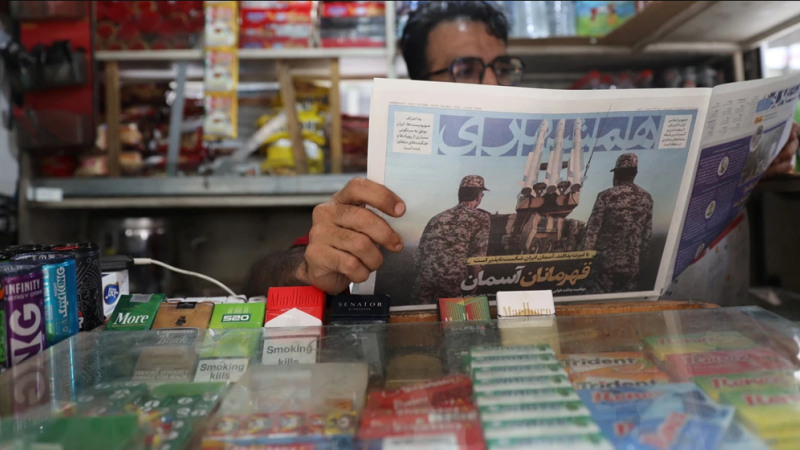Iran’s Economic Resilience in the Face of Israel's 12-Day War of Aggression

News- Middle East: Iran’s economic resilience during the 12-day Israeli aggression presented a compelling challenge to the belief that the country’s economy would crumble in the face of war.
For nearly 45 years, Iran has been under severe economic sanctions and blockades, cutting it off from the global financial system.
These measures have targeted key industries such as oil, banking, and infrastructure development, severely limiting foreign investments and access to international markets.
Despite these pressures, Iran's economy has not only survived but demonstrated a remarkable degree of stability, particularly during the recent confrontation with Israel.
Iran’s economy, under the brunt of illegal Western sanctions, is built on a foundation of self-sufficiency and domestic resilience. Unlike many nations that rely on external support or global trade, Iran has focused on developing its internal resources and capabilities.
The country's economy is not dependent on foreign aid or imports but instead has gradually become more attuned to managing its challenges through domestic innovation and technological adaptation.
During the recent aggression, Iran showcased its ability to manage essential goods through advanced digital systems, which prevented the disruption of basic supply chains.
Key initiatives such as the “bread system” and the “electronic grocery store” provided critical infrastructure that maintained stability in the supply of vital goods like bread and rice, without creating panic or long lines.
These systems allowed the government to monitor and regulate supply chains efficiently, preventing shortages and even controlling subsidy distribution during a crisis.
Iran's ability to leverage technology in managing its economy, especially in a time of war, reflects a model that could serve as an example for other nations facing similar economic isolation or geopolitical instability.
The key takeaway is that long-term planning, social cohesion, and technological readiness are critical in sustaining an economy during times of crisis.
The “bread system” launched in 2022 is part of a broader strategy to manage the distribution of flour and bread, two of the most vital components of the Iranian diet.
Contrary to initial concerns, the system did not result in scarcity but instead improved the targeting of subsidies, reduced smuggling, and strengthened government oversight of this critical sector.
In effect, the bread system served as a model for broader economic governance, particularly in times of war or sanctions.
Such infrastructure could be expanded to cover other essential goods, including rice, oil, and medicine, ensuring that even in the event of heightened conflict or new sanctions, the Iranian population could access vital resources with minimal disruption.
In addition to the bread system, Iran’s adoption of electronic grocery store technology represented another crucial element of its economic resilience.
The system provided an efficient way to monitor inventory, prioritize access to essential goods, and ensure the relative stability of the market.
Unlike the cumbersome and error-prone methods of the past, these electronic systems provided real-time data on consumption patterns, helping the government direct resources where they were needed most.
In the event of an escalation in the US and Israeli aggression or the imposition of additional sanctions, this electronic infrastructure could prove invaluable in managing supply chains and ensuring equitable access to essential goods.
By reducing reliance on manual processes, Iran has created a more agile and responsive system capable of withstanding shocks to the economy, be they from external sanctions or internal disruptions caused by conflict.
One of the most important lessons from Iran’s economic experience is the role of social cohesion in fostering resilience.
While Iran’s technological and infrastructural tools have been critical, they alone cannot explain the nation’s ability to withstand the recent aggression and prolonged crises.
The country’s enduring sense of identity and unity, despite external pressures, has been a key driver in its ability to weather economic storms.
Unlike some countries where populations might flee or become disillusioned in times of hardship, Iranians have largely remained committed to their homeland, continuing to invest in their land and culture.
This social cohesion, combined with the country’s economic resilience, has enabled Iran to endure even in the face of overwhelming outside pressures.
The recent war between Iran and Israel highlights the stark differences between their economic models - one based on external dependencies and the other built on domestic resilience, social cohesion, and technological innovation.
Iran’s model of self-reliance and long-term planning has proven to be surprisingly effective in withstanding the pressures of war and sanctions, while Israel’s economy, despite its initial strength, is far more vulnerable to external shocks.
The battle indicated that the true measure of resilience may not lie in GDP figures or military strength, but in the ability of a nation to endure, adapt, and maintain stability during times of crisis.
As history has shown, the nations that are able to build robust internal systems, foster social unity, and leverage technology to manage their economies in times of uncertainty are often the ones that emerge victorious in the long run.
The Iranian experience offers valuable lessons for other nations, especially those under sanctions or facing geopolitical instability, about the importance of self-sufficiency, technological infrastructure, and social cohesion in times of war.
Source: Press TV
#Iran #Israeli Aggression about 2 days-
10:07
Almasirah correspondent in Sa'adah: Massive public rally held under the slogan "Steadfast with Gaza – Readiness and Mobilization Against Aggression"
09:58
Almasirah correspondent in Gaza: Repeated enemy helicopter landings suggest casualties among Israeli soldiers in Khan Younis incident
09:57
Almasirah correspondent in Gaza: Loud explosions shake eastern and northern areas of Khan Younis; enemy helicopters land repeatedly
09:56
Palestinian Sources: 3 killed, several injured in Israeli enemy airstrike on a home in Al-Sabra neighborhood, south of Gaza
09:54
Israeli enemy media: Reports of a serious security incident in Khan Younis





